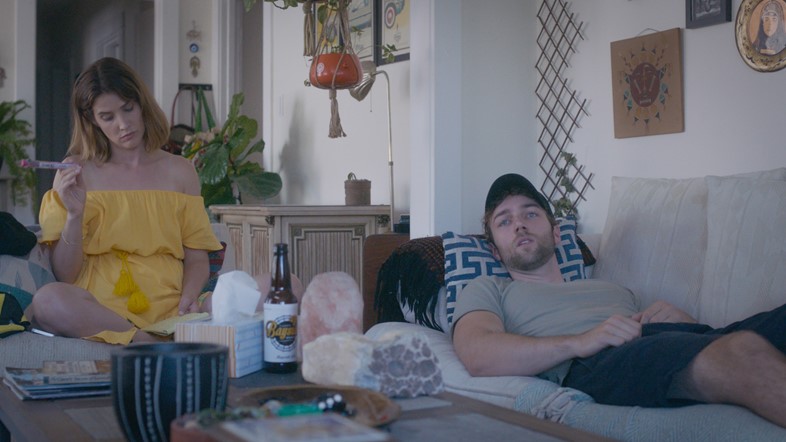Cicada stars and co-writers Matthew Fifer and Sheldon D Brown discuss intersectionality on-screen, unselfconscious sex scenes and drawing on personal trauma for the sake of art
No person is just one thing, but few films understand this as well as Cicada. Co-written by its stars, Matthew Fifer and Sheldon D Brown, it’s a queer romantic drama with a lead duo who aren’t just dealing with their sexuality. Ben (Fifer) is a Brooklyn handyman whose drunken one-night stands and sudden bursts of hypochondria hint at unresolved psychological issues. Gradually, we learn that Ben is profoundly affected by childhood sexual abuse that he has barely begun to grapple with. Sam (Brown), a data analyst Ben meets while browsing for books, initially seems more self-possessed, but turns out to have wounds of his own. When he and Ben have sex, we see that Sam has a colostomy bag, a nagging reminder that he was badly and shockingly injured in a drive-by shooting.
“They’re multifaceted people with a lot of shit going on in their lives,” Brown says of their characters. “They’re queer, but they’re also Black and white and having an interracial relationship in America. Sam has this line in the film: ‘I’m already the only Black guy at work – I don’t wanna be the only [openly] gay guy too.’” Brown says weaving these intersectional experiences into fully three-dimensional beings wasn’t just a question of being authentic, but also one of LGBTQ+ representation. “Yes, there’s sex and partying in our film,” he says, “but we’re also showing that queer people have complex stuff to deal with in their relationships the way straight people do.”

Both Brown and Fifer, who also co-directed the film with Kieran Mulcare, drew heavily from their own lives when writing the screenplay. Like Sam, Brown is dealing with the severe emotional and physical trauma of being shot on the street by a complete stranger. Fifer credits Brown, Mulcare and producer Jeremy Truong with helping to create a “supportive” environment where he felt “held” enough to film potentially triggering scenes rooted in his own history of childhood abuse. “On the days where maybe I thought I didn’t want to come to set, I knew Sheldon was going to come to set – and if he was gonna do the work, so was I,” he says. “And Kieran was so incredibly patient with me. We would meditate for like 20 minutes before doing certain scenes. Because we had such a skeleton crew, it didn’t feel like 40 people were just standing around waiting for me to cry.”
Brown says that while writing the screenplay, the key “through line” was making sure that Ben, Sam and their evolving relationship always felt “as real as possible”. "We’re sharing our stories with the world, which is kind of daunting, but at the same time, the things we’ve gone through don’t belong solely to us,” he says. “Other people who’ve had these experiences haven’t had the opportunity to put a voice to them, so we didn’t want to do them a disservice.”
But at the same time, he and Fifer were very conscious of telling a story that would keep their audience fully invested. “This movie can be a slow burn, but life can be a slow burn,” Brown says. “But also, we knew we only had like 90 minutes with these characters, so everything had to feel heightened. We had to turn the dial up on everything to make it feel more present and elevated.” At times, Cicada is arguably a little too heightened. Ben’s daffy therapist Sophie (Cobie Smulders), a broadly written character with a dog called Klonopin, probably belongs in a less naturalistic film. But for the most part, it tells Ben and Sam’s story with tremendous empathy and a deftness of touch. A scene in which Sam, who is still in the closet, takes Ben to meet his traditionally minded father (Michael Potts) unfolds in a way that feels surprising, but also authentic and quietly touching.
Actually, there’s something supremely moving about Cicada overall, and that’s partly because it’s rare to see human frailty captured so sensitively and unselfconsciously on screen. How often do we see someone with a colostomy bag having sex? The fact it’s presented as no big deal for Sam and Ben makes this intimate moment feel even more special. Fifer says that because people “probably haven’t seen a story quite like this before”, the film is helping people to “negotiate stuff in their own lives that maybe they haven’t even thought about”.
Brown agrees, then admits he wasn’t expecting Cicada to have such a global reach – he’s received appreciative DMs from Poland, the Netherlands, Greece and the Philippines. “These people are so deeply moved and feel so deeply connected to us,” he says. “And it goes to show that our stories, they’re everywhere – they exist everywhere, they’re felt everywhere. And that just makes our own personal experiences feel even more real.”
Matthew Fifer and Jeremy Truong will be at Rio Cinema, Dalston on February 14 for a post-screening Q&A. Cicada is also available to view on-demand now.
